In the company’s efforts to reduce emissions of polluting substances from its vessels into the atmosphere and oceans, Toyofuji employs a variety of equipment and conduct research and development in consideration of the earth’s environment.
Working with shipyards and other parties, Toyofuji is working on the use of naturally occurring microbes to treat bilge (oily water) produced within the vessel and further prevent pollution of the seas.
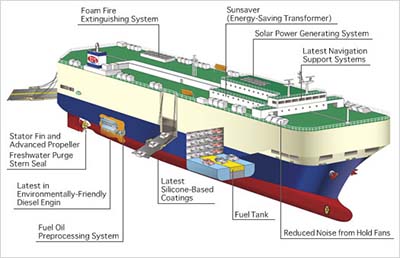
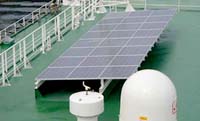
The vessel features an on-board solar power generating system, with clean solar energy used to supply power illumination on the vessel.
The stator fin recovers rotational energy in the vortex behind the propeller to improve propulsion efficiency. Equipped with Freshwater Purge Stern Seal The vessel utilizes a freshwater purge-type stern seal to prevent leakage of oil from the vessel due to damage to the stern seal (a component that protects the propeller shaft from seawater intrusion and prevents the shaft’s lubricating oil from leaking out of the vessel) caused by floating objects (e.g., fishing nets) becoming wrapped about the shaft and other structures.

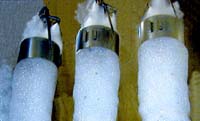
Whereas vessels previously were equipped with fire extinguishers using carbon dioxide to put out fires, vessels currently under construction are being equipped with foam-type fire extinguishing systems that do not pollute the air or sea.
The vessel makes full use of environmentally responsible engine designs providing low fuel oil consumption and low NOx emissions. This engine also features a new cylinder lubrication system that improves combustion efficiency while reducing the consumption of lubricating oil. Furthermore, vessels currently under construction will include a single fuel valve system to improve combustion at low speeds.
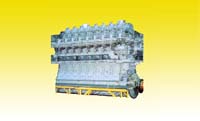
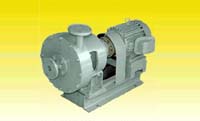
Research and development of fuel oil preprocessing systems aimed at improving combustion efficiency have also resulted in reduced emissions of pollutants into the atmosphere.
With this three-layer construction, the fuel oil tank is protected by the ballast tanks to prevent spillage of fuel oil in the unlikely event of a collision. Furthermore, to reduce the impacts of ballast water on the ecosystem, vessels currently under construction will employ fixed ballasts, thereby reducing the use of ballast water.
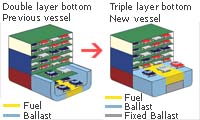
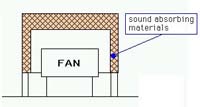
As a measure to reduce noise affecting residents living near harbour areas, fans in the hold have been changed, with high-speed fans being substituted with models with low rotation speeds, with further measures such as inclusion of sound-absorbing materials adopted.